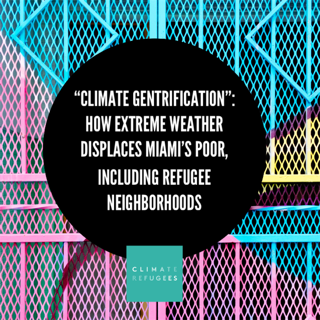In an interview with Thomson Reuters Foundation, Gaston Browne, a former banker himself, said Antigua and Barbuda was forced to revise its plan to be carbon neutral, ten years ahead of the 2050 benchmark, due to the "perilous situation of debt" his country of less than 100,000 people now face.
With the Covid-19 pandemic restricting travel, the country’s economy is expected to shrink about 30%, pushing its debt limits from 70% to 95%. Antigua and Barbuda is not alone, and stands with other small island states, who we detailed in this SPOTLIGHT last September, that called on donor governments and development banks to help them avert a looming crisis through debt relief and climate finance for 44 small island and low-lying coastal developing states.
"I am afraid we could find ourselves in a debt crisis and that all of the (development) gains we have made over the last several decades... could be eroded," he told the Thomson Reuters Foundation.
The Prime Minister is asking for developed countries to provide more funding for green energy. With sufficient support, Antigua and Barbuda could reach net zero carbon emissions by 2040 or even earlier. Browne says Barbuda, which Hurricane Irma in 2017 devastated and forcibly evacuated nearly all its 2,000 people, could reach that target within two years by installing solar power.
However, as we detailed in this just-released policy brief to the Biden administration, rich countries are woefully under-target on meeting their global adaptation finance pledges. Not only is there a five to 10 times shortfall from UN suggestions of $140-$300 billion annually, some rich nations have over-reported their finance contributions by as much as $20 billion.
An additional barrier for Antigua and Barbuda, as with other Caribbean countries that Browne called "unconscionable," is its classification as a high-income country, making grants and cheap credit out of reach.
The barrier it faces is that, alongside some other Caribbean island nations, it is classified as a high-income country and thus not eligible for grants or cheap credit.
Our policy brief pointed out these same issues at play in northern Central America, where most countries are middle-income classified, overlooking the relatively high rates of rural poverty in the vital agricultural Dry Corridor region, where climate change is one of many factors impacting forced migration from the region.
As we recommended to the Biden administration, current global climate action is fragmented, lacking coordination and linkages to intersectional work. That shortfall then leads to overlooking systems and structures, in this case economic classifications, that fail to take into account climate threats that increase vulnerabilities.
Environmental Accountability
Gaston Browne told Thomson Reuters of plans to push for long-delayed compensation for the impacts of climate change, via "loss and damage" within the UN climate framework, adding these impacts are not only affecting poorer countries, but also rich coastal cities like Miami and New York.
We would add these rich cities have plenty of poor residents, many of whom are already feeling the unfair imbalance of redress that give those with means better adaptation.
You see these effects in refugee and immigrant communities in Miami’s Little Haiti neighborhood, and in parts of Hurricane-Sandy struck Brooklyn, where Black residents and lower-income residents are increasingly pushed out.
As for Browne, he told Thomson Reuters “if greater efforts are not made by wealthy emitting countries to curb climate heating and protect at-risk communities with more finance, the flow of "climate refugees" seeking shelter in rich nations would likely increase. If there is no climate stability, there cannot be peace and security in the world."
We noticed he said the same last month. Only this time to the UN Security Council, in a high-level open debate on climate and security. Browne, representing both Antigua and Barbuda and the Alliance of Small Island States (AOSIS), said the time had come for “environmental accountability” in systems to evaluate loss and damage in line with rights, and to address displacement, “climate refugees” and loss of territory.
Hearing that, and the significance of that statement to the most powerful UN body, alongside the fact that just a few short years ago, AOSIS did not think it politically prudent to pursue “loss and damage” compensation just yet, may speak to the minimal progress made in climate action, against the rapid advancement of climate change.
More thoughts we pondered and recommended the Biden administration do as well. (Thomson Reuters Foundation)




